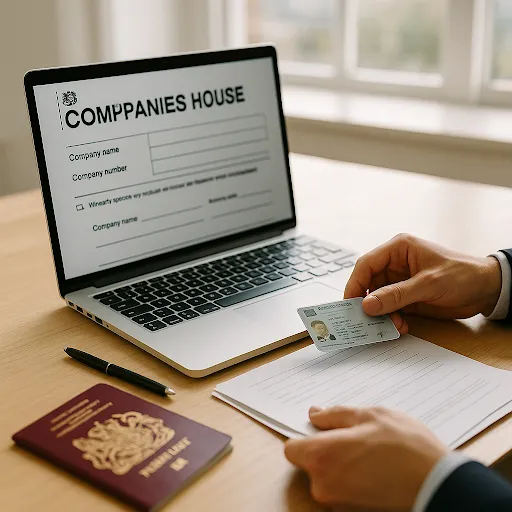Company formation services guide businesses through incorporation and legal compliance in the UK. They reduce risk and keep founders focused on growth.
TL;DR / Key Takeaways
- UK company formation services coordinate registration with Companies House and manage ongoing compliance such as annual filings, PSC records, and director identity checks.
- Recent 2024–2025 changes require stronger director and PSC identity verification and push toward digital filing; digital-only accounts could become standard by 2026.
- A local London or Hemel Hempstead partner can provide a registered office, tax registration, and ongoing secretarial support as part of a package.
- Choose providers that bundle formation with bookkeeping, payroll, and VAT to simplify ongoing compliance.
What are company formation services and why do they matter for compliance?
They create legal entities and keep them compliant after incorporation. These services file incorporation paperwork, perform director and PSC checks, and supply a registered office.
Core functions
Formation providers submit the incorporation application to Companies House, file articles of association, and register initial directors and shareholders. Professional Company formation services ensure compliance and speed up the process of starting a new business. This prevents common filing errors that cause delays.
Beyond formation
Many firms provide secretarial support, accounts preparation, payroll, and tax registration. These services ensure continuous compliance with HMRC and Companies House obligations.
Support for startups, contractors, and SMEs
Formation partners help startups, contractors, and small businesses pick the right structure and meet reporting deadlines. Local expertise reduces setup friction for first-time founders.
How UK law shapes formation and ongoing compliance
UK law defines filing requirements and timelines. The Companies Act 2006 and Companies House rules govern incorporations and statutory reporting.
Key legal references
Companies Act 2006 sets duties for directors and corporate filings. Companies House handles incorporation and public records (see Companies House).
Identity verification in practice
Directors now need ID checks before appointment in many cases. This reduces fraud and improves corporate transparency across the register.
Digital filing and records
Authorities expect digital-ready businesses. Secure handling of personal data is essential when using eID checks and online portals.
The UK formation process with compliance in mind (step-by-step)
Follow these steps to incorporate and stay compliant.
Step 1 — Choose structure and ownership
Decide between a limited company, partnership, or LLP. Confirm share classes and ownership percentages.
Step 2 — Prepare documents
Gather IDs, proof of address, director details, and shareholder agreements where needed.
Step 3 — Choose a registered office
Pick a registered office or service address in the UK. Local options help with mail handling and public records.
Step 4 — Submit to Companies House
File the incorporation application and articles. Providers often handle this to reduce errors.
Step 5 — Register for taxes
Register for Corporation Tax with HMRC and consider VAT registration if turnover warrants it.
Step 6 — Establish ongoing compliance framework
Maintain statutory registers, file confirmation statements, and prepare annual accounts on time.
Step 7 — Aftercare
Monitor PSC changes, complete director ID checks, and use corporate secretarial support to avoid penalties.
What to look for in a UK company formation service
Select a provider with proven compliance skills and clear pricing. Ensure included features match your ongoing needs.
Selection criteria
Look for compliance expertise, transparent fees, registered office, annual filings, eID checks, and optional bookkeeping or payroll. Local presence in London or Hemel Hempstead adds convenience.
Local angles: London vs Hemel Hempstead
Local presence affects turnaround times and meeting options. London operations often handle larger client volumes while Hemel Hempstead partners offer closer in-person access.
How Interface Accountants supports formation and compliance
Interface Accountants offers one-stop formation plus accounting, payroll, VAT, and registered address services. They provide ongoing secretarial support and digital records. Learn more on their company formation page.
International and special-case considerations
Non-UK jurisdictions suit certain holding or tax structures. Cross-border formations need separate compliance checks and reporting.
Ongoing compliance obligations after incorporation
Companies must file confirmation statements, annual accounts, and keep director and PSC details up to date. Late filings attract penalties and can be corrected with professional help.
Real-life examples / Use cases
- London e-commerce startup: formation, VAT registration, and monthly bookkeeping.
- Hemel Hempstead contractor: switched from sole trader to limited company with payroll support.
- International investor: UK subsidiary with Isle of Man holding company and tailored compliance.
Common mistakes and how to avoid them
Missing ID checks, outdated PSC records, and late filings cause penalties. Use a provider that combines formation with ongoing secretarial services.
Quick-start checklist
- Gather IDs, proof of address, and share structure.
- Choose a registered office.
- Pick a formation service with compliance features.
- Schedule ongoing accounting and tax support.
FAQ
Q: What documents are required to form a UK company?
A: You need director and shareholder names, addresses, IDs, and the company’s proposed registered office.
Q: How does identity verification affect directors?
A: Directors must provide ID and address checks, which can delay appointments until verified.
Q: What are ongoing compliance duties after formation?
A: File confirmation statements, annual accounts, and keep statutory registers current.
Q: Do formation services offer a registered office and secretarial support?
A: Yes, many include a registered address and ongoing secretarial services.
Q: Can I form a company outside the UK and still have UK compliance?
A: You can, but cross-border structures need separate UK filings and possibly a UK establishment.
Q: How long does UK company formation typically take?
A: Online formations can complete in 24 hours; complex cases take several days.
Closing summary and next steps
Choosing a compliant, end-to-end formation partner reduces legal risk and saves time. To discuss formation and compliance for your London business, schedule a meeting or request a personalised quote with Interface Accountants via their company formation page.
 Skip to content
Skip to content


